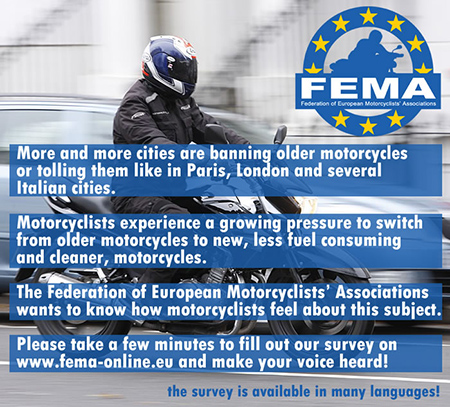 Europe – The Federation of European Motorcyclists Associations (FEMA) is asking motorcyclists to fill out its survey on emissions!
Europe – The Federation of European Motorcyclists Associations (FEMA) is asking motorcyclists to fill out its survey on emissions!
With growing pressure from city councils on older motorcycles with less than Euro 3 (built in 2006 and earlier) and threats or even concrete plans to ban them from cities, or toll them like in Paris, London and several Italian cities, we are experiencing a growing pressure to switch from older motorcycles to new, less fuel consumption and cleaner motorcycles.
At Motorcycle Minds we ask what is this Euro 3 that is referred to?
“Starting at the beginning in 1997, with Euro 1 emissions standards (European environmental standards, usually referred to as ‘Euro’ standards) were implemented to reduce pollutant emissions from motorcycles (two- and three-wheel vehicles, which in later legislation are referred to as Category L vehicles.)
In 2002 Euro 2 and 3 standards for motorcycles were implemented and in 2013 a new regulation expanded the number of L-categories and established implementation dates for Euro 4 and 5.
This regulation sets more stringent emission standards for hydrocarbons, carbon monoxide, nitrogen oxides (NOx) and particulate matter (PM). Euro 4 also introduces OBD (On Board Diagnostics) stage 1 (OBD – monitoring systems able to identify and inform the user about vehicle malfunctions that reduce vehicles’ environmental performance) requirements for motorcycles and three-wheelers. Manufacturers are now required to – as part of the type approval process – report carbon dioxide (CO2) emissions. Sources: Transport Policy.Net – ACEM – the Motorcycle Industry In Europe.”
In other words if we claim that motorcycles are more emission friendly then the proof must be there to make the claims and this proof requires legislation – for the production of more emission friendly motorcycles – scooter – mopeds (Powered Two Wheelers PTWs) with or without a combustion engine – one would think?
However it’s not all about “technical” emissions issues, it also includes the PTW within integrated transport policies – the mobility to get around.
 ACEM – the Motorcycle Industry In Europe highlights this in its policy area:
ACEM – the Motorcycle Industry In Europe highlights this in its policy area:
“Europe’s cities are main engines of economic growth, but today’s urbanisation trends are generating increased congestion, greenhouse gas emissions, air pollution, noise, waste of energy and avoidable associated costs. Quality of life and prosperity in European cities rely on efficient and sustainable mobility while economic and individual development of citizens depend also on affordable and adaptable transport options.
PTW provide significant environmental advantages over current patterns of car use.
PTW Addresses the transportation problems outlined above, whilst at the same time allowing people to continue to enjoy the freedom that personal powered transport gives.
Can play a positive role, along with the encouragement of cycling, walking and public transport in developing an integrated transport strategy for the future.”
So while authorities ban or toll the PTW on technical emissions they are not as ACEM says generally about stakeholders , “Recognizing motorcycles, scooters and other light vehicles designed for urban use as a tool in the fight against traffic congestion and the challenge of urban mobility represents a step toward the solution of the urban mobility problem.”
Here in France, FEMA member organization, FFMC (Federation Francaise des Motards en Colere) and other rider groups not part of FEMA, Fédération des Bikers de France and Ligue de Défense des Motards are lobbying and demonstrating in their respective manner against cities introducing motorcycling restrictions.
In the meantime, FEMA wants to know how motorcyclists across Europe feel about the threats, bans or tolls for older motorcycles or the pressure to switch to new, less fuel consuming and cleaner motorcycles.
You can help them by completing their short survey, with the questions slanted towards what if you had to give up your older motorcycle or your combustion engine motorcycle, would you make the switch to non-emissions bike (electric/fuel cell) or would you change transport mode. The questions are mandatory and we fell at the first question as the answers are – I would buy a newer motorcycle – I would change transport mode – none of this applies.
Or would you demonstrate on the streets to defend yours rights like French riders …………….. No it doesn’t ask that – but FEMA asks – in the language of your choice – for a few minutes of your time.
Make your voice heard!
FEMA survey on emissions – Click Here


Comments from Dr Elaine Hardy – The survey is pretty amateurish. The definitions are not explained – e.g. what does older motorcycle mean? What does Euro 3 etc mean? Is the purpose of the survey to push people towards electric bikes? (The reason I think this is based on previous press releases by FEMA). Why is there no “I don’t know” alternative to the questions? Finally, my understanding is that major cities are inclined to exclude vehicles that do not meet specific standards and not necessarily the age of the vehicle. Might be worth doing your homework first? Just saying… @motorcyceminds#